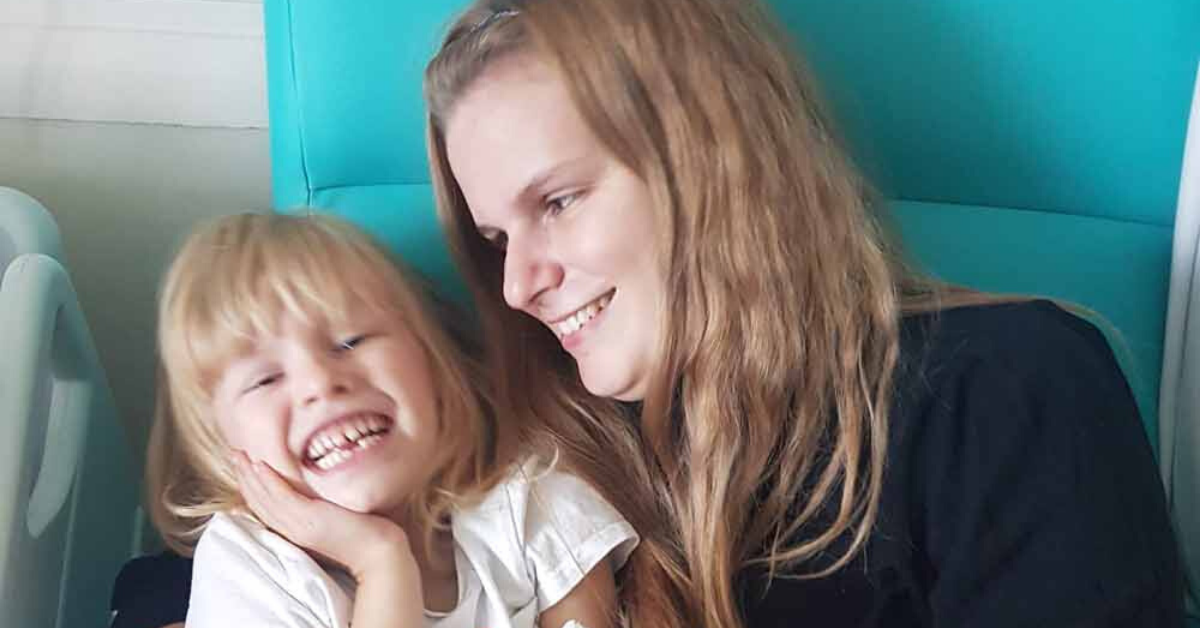Sometimes kids have mood changes. Thankfully this mom discovered that there was more to her daughter's sudden angry outbursts as she was diagnosed with a potentially lethal brain condition.
For months Sophie Tesarz-Southby and her husband Misha struggled to find out what was wrong with their six-year-old daughter Amelia.
At first, they attributed her unusual behavior to a sinus infection. Later on, doctors diagnosed autoimmune encephalitis, an incurable condition causing the brain to swell.

“At first, she would have these bursts of anger and she just wasn't able to listen," Tesarz-Southby said.
“She really deteriorated and even her teachers picked up on the fact that she wasn't herself. But just months later she was in intensive care and we feared we might lose her."

Amelia's problems began in December 2018, when she started behaving badly at school.
“She had always been very good. She loved school and was top of the class in reading and maths, but all of sudden she started behaving very badly," Tesarz-Southby said.
“At first, we wondered if she was struggling with something – maybe bullying. She had started in reception class in the September, but she loved school, so we were confused."
“Then we thought perhaps it was because I had started college and wasn't at home in the evenings, but whatever it was, she just wasn't herself."
Between Christmas and Easter 2019, Amelia's behavior deteriorated and her worried parents took her to their GP, who suggested she might be seeking attention.
Deciding that more family days out could help, the couple organized trips to places like Legoland and Chessington World of Adventures, but her odd behavior returned soon after.
“She would be fine when we were out, but then her behavior would deteriorate again when we got home," said Tesarz-Southby.
That Easter, the family took a caravan holiday in Skegness on the Lincolnshire coast and visited Tesarz-Southby's aunt.
“Again, she just wasn't herself," said Tesarz-Southby. “She seemed to be confused about where she was and how she got there.
“She couldn't understand why we were at my aunt's house and not the caravan, or why she was at the caravan and not at school."
Amelia also started having "absence" seizures, where she would just freeze and stare off into space, which got worse after the family holiday.

“She would just stand and stare and there was no way of snapping her out of it," she said.
“You could clap your hands in front of her, but there would be no response."
The family doctor referred Amelia to a seizure specialist, who enquired again if there were problems at home, before asking her parents to try and record her having a seizure.
“You're so worried about your child when they are having a seizure, you don't stop to think about picking up your phone and recording it," she said.
“All the way through, before she was diagnosed, we were asked if there were problems at home that were causing her behavioral changes and that made me feel very guilty. I was thinking, 'Am I doing something wrong? Should I be going to college?'"

“I broke down at school with the teachers and asked them if I was doing something wrong," she continued.
By June 2018, eight months after Amelia first started showing symptoms, her seizures and outbursts became so bad that Tesarz-Southby ended up in the emergency room with her every day for a week.
But doctors still suspected sinusitis to be at the root of her problems.
“By this time Amelia's seizures were getting really bad," she said. “Her eyes were rolling back in her head and her whole body was shaking."
In the end, the concerned mom persuaded doctors to keep her in hospital overnight. Tesarz-Southby's sister, Tanya stayed with Amelia.
The following morning, Tanya called telling her to get to the hospital immediately.
“When I got there, I could see Amelia had completely changed again," said Tesarz-Southby. “When she woke that morning, she was unable to speak. Her face had completely slanted to the side and if she tried to stand up her whole body just dropped."
“Her eyes were wandering, she had no idea where she was or who was in front of her. She didn't recognize me. She didn't know anything and was just making squealing noises."
But the cause of Amelia's distress continued to puzzle medics. She had a CT scan which came back clear and, although one doctor said it looked like encephalitis, according to Tesarz-Southby, four others disagreed.
Amelia was then put into an induced coma, to put less strain on her body, and she was blue-lighted by ambulance, with her mom by her side, to St. George's Hospital in Tooting, London, where she was rushed into intensive care.
“I didn't know what to think or do. I thought she might die," said Tesarz-Southby. “I was in a complete mess."
Amelia stayed in the coma for a few days and remained in hospital for two weeks while doctors carried out tests to try and work out what was wrong with her.
Sadly, when her parents brought her home a diagnosis had still not been made, but they tried to make things as normal as possible.

“Amelia was fine until we got home," said Tesarz-Southby. “She had been complaining about head pain and couldn't bear to look at anything, so I asked if she wanted to lie down for a bit."
“As we got her to bed and she lay down her eyes rolled back and it was like her own body had put her into a coma. Terrified, we called an ambulance, which arrived in less than five minutes."

“Paramedics asked if she had any seizure medication, which we didn't, before debating whether they should give her a shot, but deciding against it because we still didn't know what was wrong with her," she said.
“I really thought I was going to lose her this time."
Arriving at St. Peter's Hospital in Chertsey, Amelia was rushed into resuscitation, before being transferred back to St. George's.
In a coma for three days, when she came out of it doctors carried out multiple tests, including numerous lumbar punctures.
“When she came out of that coma she was like a different child," she said. “She was angry and wouldn't let anyone near her. She was really confused."
“The doctors still hadn't told me what they were thinking, but I kept overhearing the word encephalitis, so I started googling it."

“I have a friend who is a student nurse, so rang her to ask what it meant for Amelia, because most of the search results were about encephalitis in adults, not children," she continued.
Amelia remained in hospital from July 30th to September 20th, eventually, doctors diagnosed her with autoimmune encephalitis. Meaning her body's immune system is attacking her brain, causing inflammation and all her uncharacteristic behavior.
Other forms of the encephalitis can be triggered by viruses, including the herpes simplex virus, which causes cold sores.

“I was very relieved in a way to get a diagnosis, because I'd been saying for so long how ill she was, but had started doubting myself," she said.
There is no cure for autoimmune encephalitis, so Amelia is now on multiple medications including pills for seizures, sleeping tablets, steroids and behavior modification drugs.
Now, Amelia is back in school and Tesarz-Southby says she loves it, especially because seeing her friends again has given her a boost.
“Her friends' parents have told them Amelia might be a little bit different now and they've all been really helpful and supportive," said Tesarz-Southby.
“She is completely different to the child she was before she became sick and her consultant says there is only about a 10 per cent chance that she will go back to how she was."
“I knew that really myself. I know that she has just changed too much," she said.
“People need to understand there is a new Amelia now, but sometimes they just don't understand that, which makes things hard."
“It does feel sometimes like we've lost one child and gained a different one," she said. “Every hour is different. You can have a really kind-hearted child one minute, a really angry one the next and then a very emotional one after that. It's like having six different children in one day."
Now Tesarz-Southby is keen to raise awareness of encephalitis and to make sure parents and doctors more readily recognize the signs.
“As a parent, if I had known about encephalitis before, I could have looked for the symptoms and maybe caught it before it was so severe," she said.
“If I could save one other child and family from the grief we have experienced by telling our story and help people to get a quicker diagnosis, then it will be worth it."

You can learn more about encephalitis here.
 COMICSANDS
COMICSANDS percolately
percolately georgetakei
georgetakei secondnexus
secondnexus george's picks
george's picks















